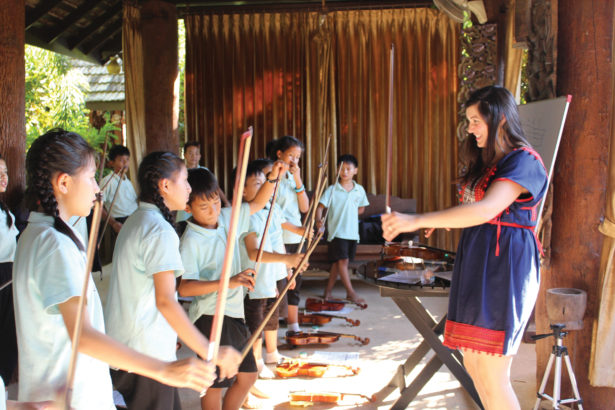By Erin Chesnut | Photos by Steve Mantilla and Courtesy of Angela Ammerman
While listening to a colleague’s story about playing the violin for children in Thailand, Angela Ammerman heard herself speak.
“I’ll go!” she blurted out. The storyteller stopped and looked at her, confused, but Ammerman heard her own voice again. “I’ll go! I’d love to go!”
Touched by listening to him tell how much the children loved music, Ammerman couldn’t help herself.
“I knew I must be insane to volunteer to do this, but I told him I would go and teach the kids how to play violin,” Ammerman says. “I knew it was one of the craziest things I had ever done, but I couldn’t seem to help myself. This was an opportunity to give back in a way I could never have imagined, and I seized the moment.”
Near the end of 2018, Ammerman, a UT Martin assistant professor of music and director of music education, spent 10 days in Chiang Mai, Thailand, teaching more than 30 orphans to play the violin at the Hope House Children’s Home. The trip required more than packing a few bags and purchasing a ticket, however. Ammerman had to find a way to supply Hope House with more than 30 violins—no small feat for one of the orchestra’s most expensive instruments.
“I was able to get 16 (physical) violin donations from various friends and from AMRO music company in Memphis,” she says.
Still short, she launched a GoFundMe campaign that raised more than $1,500 in five days. She used that money to buy instruments from a Chiang Mai luthier—Del Gesu Violin Shop.
“I was so worried this wouldn’t work out, but Aui (the luthier) met me on my first morning in Chiang Mai with all of the violins, extra strings, shoulder rests and rosin. He stayed for the entire first day, recording lessons, tuning the (violins) and helping out.”
Ammerman says her visit ultimately impacted more than just the children at Hope House. It unexpectedly touched the hearts of local musicians, including Aui, who volunteered to teach free private lessons every Saturday to the two most talented students.
Ammerman says her teaching experience at Hope House actually started with her first music students years ago.
“I have always had a passion for working with children from underserved populations,” Ammerman says. “I was really lucky that my family and my teachers never accepted the financial obstacles that always seemed in front of me (as a child). When I wanted to take music lessons but couldn’t afford it, my teacher said, ‘Well, you want to be a teacher, right? Let’s get you teaching lessons instead.’”
Ammerman opened her first music studio as a middle school student and taught her classmates who were unable to take lessons from professional instructors.
“This opened so many doors for me and led me to my current beliefs about the importance of a quality music education for all children, regardless of language acquisition, income and ‘musical talent,’” she says.
As director of UT Martin’s music education program, Ammerman prepares future music teachers to impact the lives of students at all levels—from elementary to high school and beyond. While studies have shown that music education helps raise test scores, create personal discipline, promote leadership experiences and encourage college attendance, those are not the primary reasons she believes its inclusion in all schools is important.
“Music is often the one class where a child is expected to emote without having to say anything. Music is the one space in which all players are contributing simultaneously toward something greater than the individual,” she says. “Music is a class that allows students to experience communication without speaking; it allows students to take risks without fear of being mocked; and it forces students of countless diverse backgrounds to come together and work as a family.
“There is something magical about playing a musical instrument. Suddenly, the world bursts with color, confidence soars and the impossible seems within reach… I think I have spent most of my life trying to pass along that joy and make the world a bit more musical.”
Ammerman found the magic of music at work in Thailand, where she conducted a survey with the children (through a translator) to find out how their new music classes influenced their attitudes in other areas. She says the students repeatedly described themselves as happy and mentioned having more energy and less stress in their other academic courses.
“To know that they no longer felt sleepy and worried is perhaps the most important part of this response for me,” Ammerman says. “It tells me that perhaps music has boosted their confidence and their interest in other subjects…I also did a self-concept pre- and post-study, and the preliminary results suggest that, in just 10 days, these students experienced a significant increase in emotional stability, student friendships and general self-concept.
“I saw (these children) fall in love with music. I watched as they lit a fire in one another for practicing violin, and I sat stunned as they achieved more than I could possibly have imagined in 10 short days.”
A teacher at the children’s home said the children never dreamed of playing the violin, believing it was an instrument for the wealthy. “Thank you for helping these children see beyond,” Ammerman says the teacher said.
The violins remain at Hope House Children’s Home, and Ammerman secured a group violin instructor to continue the lessons.
Ultimately, she says, the trip has given her a new purpose. “After this experience, I realized that my life’s calling is to not only teach others how to teach but to start music programs in orphanages across the globe,” she says.
Her new nonprofit organization—Heartstrings—seeks to create and support string programs to “inspire and empower underserved children across the globe—one child, one instrument, and one heart at a time.”
She also has launched a GoFundMe account to raise money for a music building at Hope House: gofundme.com/musichouse

